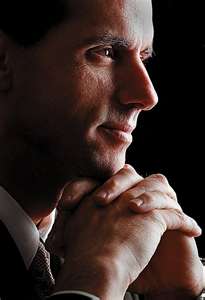Sitting here at the collision of two startling streams of information got me thinking about being inspired by powerful individuals, and how their inspiration can affect our work and our lives.
A high school reunion in October revived a network of old friends, as well as some new ones I never really knew back in the day. This connectivity has been unleashing a torrent of lines and images about missed classmates, things we have forgotten, and how great it is to remember. The other night I tossed a “whatever happened to my most memorable teacher?” into the stream of recollection.
She taught English. I had her for only a quarter of my junior year, but her class and all she  brought to it had left its mark. In the volley that followed, I explained her with these words:
brought to it had left its mark. In the volley that followed, I explained her with these words:
I had never met a woman like that before. I can still feel the longing so many students had for her (like moths trying to merge with a flame), and how almost abandoned I felt when she did not return my last year. But I never thought our school was enough to contain or sustain her. She was too far ahead. Like a comet. I have a soundtrack in my head with the Sixties in it, but she in many ways was its personification. I don’t remember much about the class I took with her or what I read. It hardly mattered. It was really just about her. A whole new world burning through her eyes.
I expected to hear that she had gone on to conquer new mountains, to stir up dust in bigger corners, and change more lives. An old friend who knew the story better dissolved this simple future with a couple of quick sentences.
I know a good bit about Portia and her somewhat tragic life after leaving Branford. She and her husband Tom owned beautiful land in Massachusetts. They had a daughter, who was named Shelburne after the land, and Portia was expecting their second child. Tragically, while ice skating and sledding on a pond, Tom was pulling Shelburne on a sled and the rope snapped. The sled skidded onto thin ice and it broke through, taking the child beneath it. When Tom attempted to rescue her, they both ended up dying in the freezing water. Two weeks later, Portia gave birth to Lucia.
My friend knew that another relationship and daughter eventually followed, and that Portia had stayed with the memory on that beautiful land, but little more. I learned that in the intervening years she has also been farming and selling her harvest, has written a children’s book and edited multiple volumes of literary criticism with Harold Bloom and made jewelry. But the fulfillment of her promise cannot be so easily framed.
Your work and your life have gone on courageously, but how could the heat of your comet not have changed when so many cold mountains had come into your heart?
Answers are less important (how much can we ever know, how much do we need to know?) than the energy that the thought of her still throws off.
She is felling trees up there to the thunder of Romantic music—how could it be otherwise?—her mane of unruly hair still catching the light, but perhaps with more minor notes and intervals of shadow now, more summoning up of both brass and wind than once would have been necessary before striding forward to claim new destinations.

It was also the stab of unexpected tragedy that brought me back into the story of Steve Appleton.
Until last Friday, when Appleton (51) died after his single engine airplane crashed in flames following a mechanical failure, he had been the chairman and chief executive officer of Micron Technologies, a company I knew for years as the last American competitor in the semiconductor industry. It was a distinction the company enjoyed largely because of him.
 Grit and sheer life force had enabled Appleton to rise from Micron production worker at 22 to its front office less than ten years later. He also was notorious for pushing the envelope of life outside of work. A qualified stunt pilot, he flew in air shows performing loops and rolls at altitudes that were often below 100 feet. He surfed. He raced. When asked a couple of years back about the high energy levels he brought to everything he did, he said: “it is kind of a cliché, but I’d rather die living than die dying.”
Grit and sheer life force had enabled Appleton to rise from Micron production worker at 22 to its front office less than ten years later. He also was notorious for pushing the envelope of life outside of work. A qualified stunt pilot, he flew in air shows performing loops and rolls at altitudes that were often below 100 feet. He surfed. He raced. When asked a couple of years back about the high energy levels he brought to everything he did, he said: “it is kind of a cliché, but I’d rather die living than die dying.”
Many analysts predict that Micron will continue to thrive because of the strong organization he has built and the competitive advantage it still retains in the industry. Maybe the success he had in business came because he knew not only how to rev things up, but also how to slow them down: a range that was as useful for dodging bullets as it was for seizing opportunities. Appleton told a reporter in 2011: “For me, it is something like the movie ‘The Matrix.’ The [memory chip] business is in slow motion in comparison to all the other things I do.”
 So I wonder, in your dance with life and death, when the music finally stopped, did you reaffirm the bargain you had struck? Did you have second thoughts?
So I wonder, in your dance with life and death, when the music finally stopped, did you reaffirm the bargain you had struck? Did you have second thoughts?
Again, it hardly matters that this final lesson from his life is one his on-lookers and admirers can never learn from. But the other take-aways are more than enough.
You had been fully awake since you were a child. You said it was sticks in grade school, knives in junior high and guns in high school that made you face death but claim life. The music I hear is an anthem reverberating through the last fire.
We remember those who have inspired us through the gauzy lenses of time, the fragmented updates we have of them, and the suddenness of breaking news. In the remembering, we fast-forward their found energy into our lives and into our work. They encourage us to accept the invitation, to get up, and to dance.

